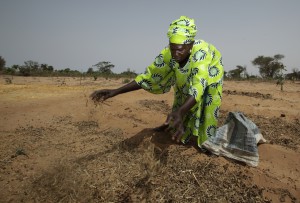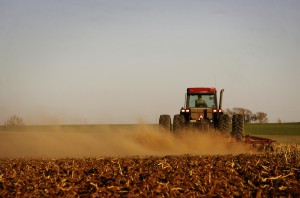Is big beautiful?
Meeting food demand is not just about producing more; it’s about producing more in a way that makes sure everyone has access to enough.
The contentious battle between the bigger-is-better evangelists for large-scale, industrial agriculture and the “local-only” believers that small, organic farming can meet all of our future food needs took an interesting turn last week with a new report from the United Nations Special Rapporteur on the Right to Food, Olivier De Schutter.
The topic at hand: how to produce enough food to feed a world with 9 billion people without breaking the planet? Here’s what De Schutter found:
“Based on an extensive review of the recent scientific literature, the study calls for a fundamental shift towards agroecology as a way to boost food production and improve the situation of the poorest. To feed 9 billion people in 2050, we urgently need to adopt the most efficient farming techniques available. Today’s scientific evidence demonstrates that agroecological methods outperform the use of chemical fertilizers in boosting food production where the hungry live — especially in unfavorable environments.”

De Schutter points to massive spikes in production of 80 – 116% when agroecological methods are applied in some of the regions most vulnerable to hunger. This strikes at the very heart of the belief that the best, and as some argue, only path to meet growing demand is to continue increasing the considerable support to ginormous industrial farms. And here’s why: meeting demand is not just about producing more; it’s about producing more in a way that makes sure everyone has access to enough.
In that way, how we get more food is just as important as if we get more food. Based on the current state of food production this should be obvious. Right now our world produces enough food to feed everyone on the planet, yet nearly 1 billion people go to bed hungry every night. We have met the challenge of boosting global production to the level where food is abundant enough for the current world population (approx 7 billion). But even though we produce enough, not everyone can get enough. This is a challenge of both production and access. For most hungry people, there is food ready to buy in the markets, but because they can’t afford it, or they lack the resources to grow their own, they go hungry.

The irony, of course, is that a large majority of the world’s hungry earn their livelihoods in food production and lives in communities that are highly dependent on farming. They produce the world’s food, yet they go hungry. This irony is also the greatest opportunity to change the game on hunger. If we direct our resources, energy, and policy into the modes of production that most efficiently boost levels of food and the livelihoods of the rural poor, we will meet the challenges of both production and access.
Anyone who tells you that we will be able to feed 9 billion people WITHOUT a major contribution from large scale, and yes industrial, agriculture is probably off their rocker. But the current polarized debate on small versus industrial farming obscures the real problem. It is increasingly clear that the lion’s share of future investments must be in smallholder farmers who have the greatest potential to make a transformational impact. But if we want to avoid that minor issue of breaking the planet in our drive to feed 9 billion people, we’ll need to reform the practices of both smallholder and industrial agriculture.